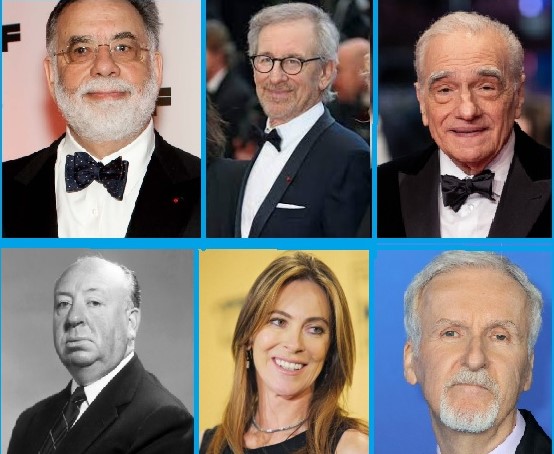The Impact of Oscar-Winning Directors on Modern Cinema

- Country:
- United States
For over 90 years, the Oscars have recognized the pinnacle of cinematic achievements, often highlighting the directors who steer these creative endeavors. Directors like Francis Ford Coppola, Steven Spielberg, Martin Scorsese, Alfred Hitchcock, Kathryn Bigelow, and James Cameron have not just made films; they've crafted experiences that have shifted the paradigms of storytelling and technology in cinema. This article delves into the careers of these luminaries and the enduring impact of their most celebrated films.
Francis Ford Coppola: A Godfather of Cinema
The Godfather's Influence on Film and Culture
Francis Ford Coppola, often hailed as a visionary, struck gold with his adaptation of Mario Puzo's The Godfather. This 1972 masterpiece not only won him an Academy Award for Best Director but also set a new standard for American cinema. Its narrative depth, character development, and moral complexity have become a template for subsequent filmmakers, influencing genres well beyond the mobster drama.
Coppola's Cinematic Style and Legacy
Coppola's meticulous attention to detail and his rich, immersive storytelling have captivated audiences and inspired a multitude of directors. His impact extends beyond The Godfather, with films like Apocalypse Now and The Conversation which have been studied for their innovative use of sound, narrative, and visuals. His influence is evident in the works of contemporary filmmakers who strive to emulate his thematic depth and narrative style.
Steven Spielberg: The Blockbuster Maestro
Revolutionizing the Film Industry with Jaws and E.T.
Steven Spielberg's name is synonymous with cinematic blockbusters. His 1975 film Jaws not only revolutionized Hollywood's business model by demonstrating the potential of wide releases and summer blockbusters, but it also set a high bar for thriller and adventure genres. Spielberg's ability to combine commercial appeal with deep emotional storytelling was further exemplified in E.T. the Extra-Terrestrial.
Schindler's List: A Cinematic Masterpiece
In 1994, Spielberg won the Academy Award for Best Director for Schindler's List, a film that remains a significant historical document and a deeply moving narrative about the Holocaust. This film showcased Spielberg's capacity for handling sensitive subjects with nuance and respect, influencing how historical dramas are approached in Hollywood.
Martin Scorsese: The Poet of the American Streets
Crafting Classics in the Crime Genre
Martin Scorsese's gritty, evocative portrayal of American life and crime in films like Taxi Driver, Raging Bull, and Goodfellas reshaped the crime drama genre. His detailed, character-driven approach to storytelling examines the complex morality of his characters and the societies they inhabit. In 2007, Scorsese won his long-overdue Academy Award for Best Director for The Departed, further cementing his influence in cinema.
Innovations in Film Music and Structure
Scorsese's innovative use of music, editing, and structure has inspired filmmakers around the globe. His films are known for their dynamic editing techniques and extensive use of popular music to enhance narrative and character development, setting trends that are prevalent in cinema today.
Alfred Hitchcock: The Master of Suspense
Innovating Thriller Techniques
Despite never winning an Oscar for Best Director, Alfred Hitchcock's influence on the thriller and horror genres is unmatched. Films like Psycho, Vertigo, and North by Northwest have become quintessential studies in tension and suspense. Hitchcock's ability to engage audiences and create suspense from everyday scenarios has inspired generations of filmmakers, including modern masters like David Fincher and Christopher Nolan.
Hitchcock's films often feature psychologically complex characters and convoluted plots that have paved the way for narrative complexity in modern cinema. His pioneering use of camera techniques, like the famous "Vertigo effect," has become a staple in visual storytelling.
Kathryn Bigelow: Breaking Barriers
The Hurt Locker: Pioneering War Drama
Kathryn Bigelow made history by being the first woman to win the Academy Award for Best Director with her 2010 film The Hurt Locker. This harrowing exploration of the Iraq War combines intense action sequences with deep human drama, offering a stark portrayal of the physical and psychological pressures of warfare.
Influence on Female Directors and Broader Genres
Bigelow's success has been particularly inspirational for women in filmmaking, a field that has historically been male-dominated. Her films, which often explore themes of violence and power, challenge the conventions of genre and narrative, encouraging a more inclusive industry.
James Cameron: Pushing the Boundaries of Technology
Redefining Visual Effects with Titanic and Avatar
James Cameron's films are often noted for their technological innovations as much as their narrative. Winning the Best Director Oscar for Titanic, Cameron showcased his flair for combining compelling storytelling with groundbreaking visual effects. This trend continued with Avatar, which not only pushed the boundaries of 3D technology but also revolutionized cinematic visuals, influencing countless films in its wake.
Cameron’s meticulous attention to detail and his push for technological advancements in filmmaking have inspired a new generation of directors to explore the possibilities of digital storytelling. His work continues to influence the aesthetic and technical aspects of filmmaking, setting new standards for visual grandeur and narrative depth.










